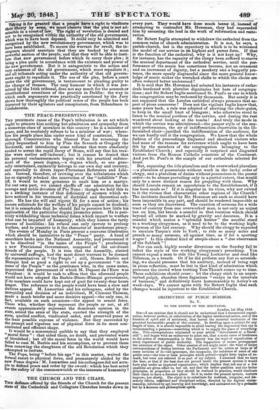THE CHURCH AND THE CHASE.
Tun defence offered by the friends of the Church for the present state of the Cathedrals and Collegiate Churches breaks down in
every part. They would have done much better if, instead Of attempting to contradict Mr. Horsman, they had superseded him by assuming the lead in the work of reformation and resto- ration.
Sir Robert Inglis attempted to withdraw the cathedral from the common rules of church administration. It is nut, he says, a parish-church, but is the repository in which is to be witnessed the model of our service in its highest and purest form. If that is the function of the cathedral, why is it not kept up? Why, for instance, has the rapacity of the clergy been suffered to starve the musical department of the cathedral service, until the per- formance of the music has sometimes become, not an ornament and an increment of dignity, but a mockery and a beggarly pre- tence, the more openly disgraceful since the more general know- ledge of music makes the wretched shifts to which the choirs are often reduced better understood ?
It is said that Mr. Horsman had selected his instances of cathe- drals burdened with pluralist dignitaries but bare of congrega- tions ; and Sir Robert Inglis mentioned St. Paul's as one in which the congregation may be reckoned by thousands. But surely it is not supposed that the London cathedral always presents that as- pect of pious concourse ? Does not the vigilant Inglis know that, some years back, a rule was adopted of shutting the choir-gates, to keep in the small knot of loungers ; who otherwise stood to listen to the musical portions of the service, and during the rest wandered about looking at the tombs ? And truly the mode in which the service was administered—the pauper style of the mu- sical performance, the air of indifferentism observable in the ill- furnished choir—justified the indifferentism of the audience, for we can hardly call it the congregation. We know that the whole fashion of the proceedings disgusted and shocked visiters who had none of the reasons for reverence which ought to have been felt by the members of the congregation belonging to the Established Church ; and especially it surprised and disgusted visiters from the Roman Catholic countries of the Continent. And yet St. Paul's is the sample of our cathedrals selected for boast.
But, supposing the idle pluralism and the overworked pluralism —a pluralism of possessions without work in the lucky order of clergy, and a pluralism of duties without possessions in the poorer order—to be abuses prevailing only to a partial extent, that would only be a more distinct reason for grappling with them. Why. should Lincoln remain an opprobrium to the Establishment, if it has been made so ? If it is singular in its vices, why not extend to it the virtues that characterize other regions of the Church? The incidents described by Mr. Horsman are such as should have been impossible in any part, and should be rendered impossible as soon as they are discovered. The exaction of sermons for a wide tract of country from one overworked man, is not only an unjust tax on him, but breeds a scandal in that vocation which should beyond all others be marked by gravity and decorum. It is a scandal which makes a "splendid hunter" the needful steed to a working clergyman, as it used to be to the working high- wayman of the last century. Why should the clergy be expected to emulate Turpin's ride to York ; to ride so many miles and preach so many sermons, all against time, as if for a sporting wager ? Is this clerical kind of steeple-chase a " due observance of the Sabbath " ?
Nor can such highly secular diversions on the Sunday fail to infect the style of the working clergyman's preaching. You cannot expect a man to ride like Young Lochinvar and read like Tillotson, in a breath. Or if he did perform any feat so astonish- ing, we should presume that his auditory, instead of being rapt in pious reflection, must be lost in that kind of admiration which possesses the crowd when trotting Tom Thumb comes up to time. These exhibitions should cease : let the clergy stick to an unper- turbed pulpit, abandon these fugacious "essays in the intervals of business," and definitively leave horsemanship to Astley's on week-days. We cannot agree with Sir Robert Inglis that such changes would be injurious to the Established Church.






















 Previous page
Previous page